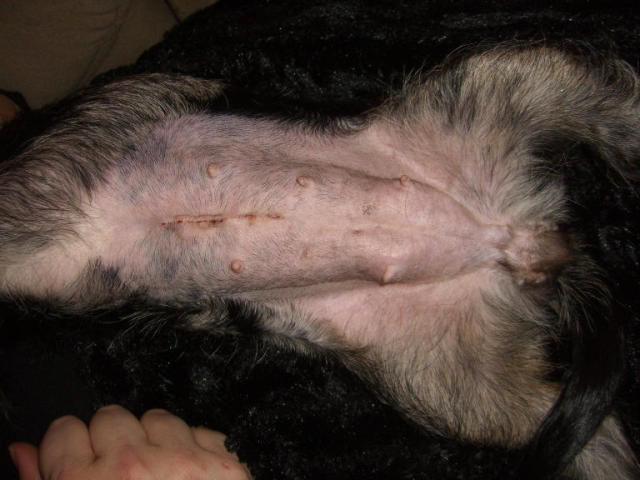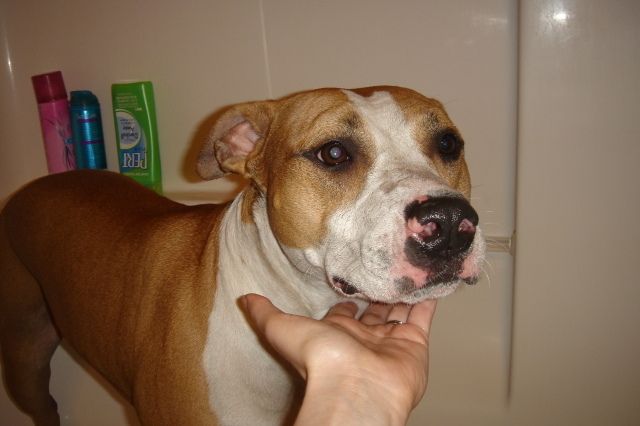QuestionHello,
I have a 2 year old half Bernese-half German shepherd female dog. Since she was a pup her front leg joints would pop or crack when she got up. Occasionally, she would whimper as though in pain.
She has been to the vet for this twice. Had xrays of her elbows and shoulders with nothing seen. Yet, she still pops and will cry at times, walks it off and is then fine. I have started her on one aspirin a day because the only thing the vet could offer was Rimadyl or cortisone, neither I wanted to give her. She still pops but doesn't seem to cry as much.
Could this still be Pano at her age? She already weighs around 100# but is not over weight and is on a very high quality diet.
Am I doing enough for her? Is there anything else you could recommend?
Any information or ideas would be appreciated.
Thank you.
Gellia
AnswerHi Gellia,
Don't don't lie. If your dog is whimpering when she gets up, or when her joints pops, you can be sure that she's in pain.
Panosteitis, or "Pano" is a growth disease which is common in large breed dogs. It can show up as young as 6 or 9 months and usually does not occur after a dog is 18 to 20 months.
Pano is an extremely painful condition. Aspirin can be be helpful, but in severe cases, corticosteroids or Rimadyl work better to provide relief.
A lot has been written about the dangers of Rimadyl on line. You should read recommendations from credible sites, with factual information. No medication is without the possiblity of side effects, not even aspirin. Rimadyl is a remarkable drug for many dogs. If your dog must be on Rimadyl for months, then blood work should be done to monitor her liver values.
The choice of medications to use in a particular dog should always involve an evaluation of the risk to the dog versus the expected benefit. For example, Heartworm treatment medications cause death in 1 to 2% of patients - a far greater risk than most medications, but when the effects of not treating for heartworms are considered, this seems like a small risk. With care Rimadyl can provide your dog with the pain relief she needs.
Many veterinarians believe the Pano is made worse by calorie-dense diets and over-supplementation with calcium and phosphorus. So a diet change to an adult formula, or a large breed growth formula, is recommended. The dog should be fed an amount that does not promote obesity or overly rapid growth. Calcium and vitamin supplements should also be avoided.
Some have treated their dogs successfully with acupuncture and chiropractic treatments, but your dog should receive pain medication on top of these treatments. You can locate a veterinary acupuncturist here:
http://www.aava.org/php/aava_blog/aava-directory/
http://www.komvet.at/ivadkom/_usa.htm#pract
You should take comfort in the fact that this disease usually runs a short course and almost always disappears without specific treatment. It has an excellent prognosis.
Best of luck,
Patti

 Dachshund spay - swollen mammaries
Question
Lilly
Hi Patti,
We took our 10 month old mini
Dachshund spay - swollen mammaries
Question
Lilly
Hi Patti,
We took our 10 month old mini
 Older dog with distended stomach.
Question
Belle
Hi, my 14 year old miniature dachshund,
Older dog with distended stomach.
Question
Belle
Hi, my 14 year old miniature dachshund,
 My 2 yr old blacks eating habits.
Question
Pic of Tula
I have a 2yr old black lab. Her an
My 2 yr old blacks eating habits.
Question
Pic of Tula
I have a 2yr old black lab. Her an
 pugs
Question
micah and lacy
my male and female are the same
pugs
Question
micah and lacy
my male and female are the same
 Dog breed?
QuestionQUESTION: Hi Nancy,
I am attaching an image of
Dog breed?
QuestionQUESTION: Hi Nancy,
I am attaching an image of